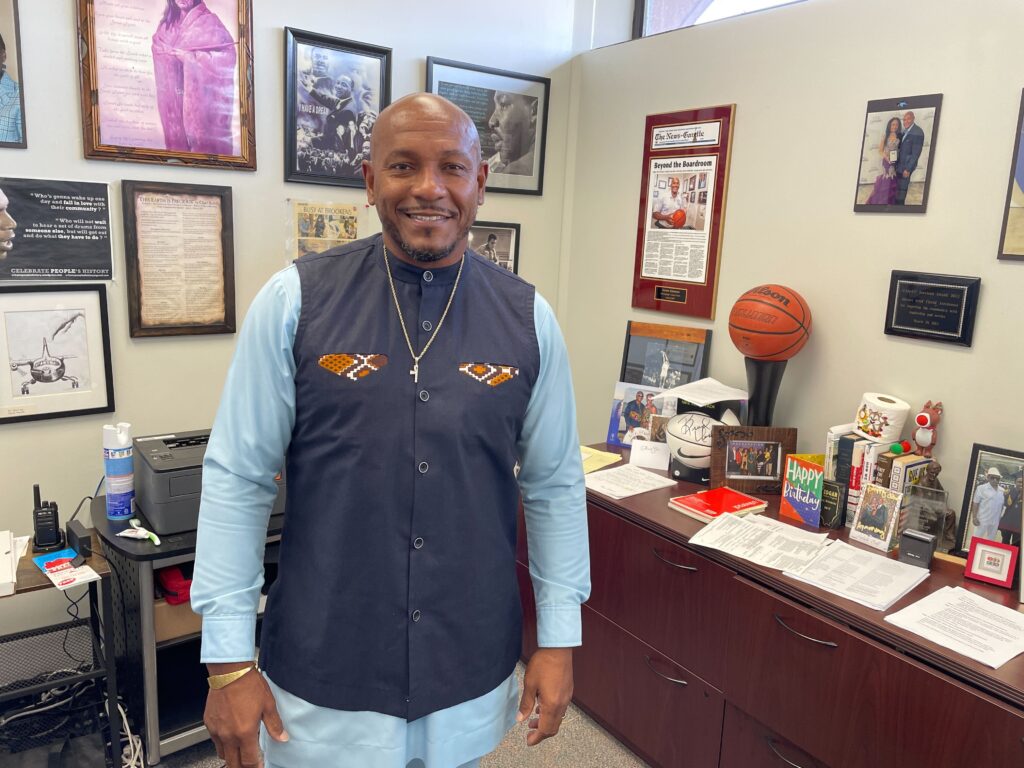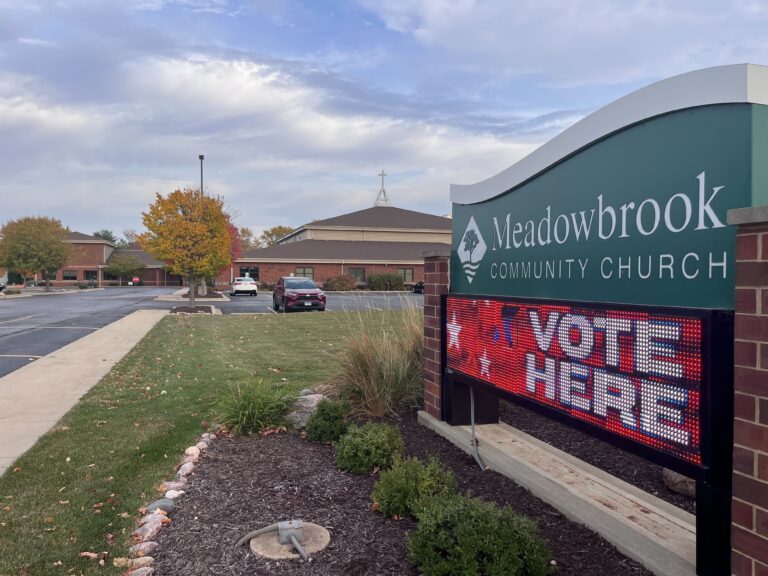With one week until Election day, officials in Champaign County are urging the public to abide by voting rules after incidents where violence and unlawful political activity occurred at polling places.
County Clerk Aaron Ammons said there was a physical fight Saturday at the Meadowbrook Community Church voting center. He said an individual wore a hat expressing support for former president Donald Trump. State law prohibits people from “electioneering,” which includes sharing campaign materials or wearing clothing with partisan messages within 100 feet of a polling place.
The person refused to remove their hat after being asked by an election judge, and “things spiraled from there,” according to Ammons.
“I would like to sincerely thank the three election judges who were working on Saturday and continue to serve until the end of their shift, despite being subjected to this hostile and unlawful behavior,” he said during a Tuesday press conference.
“Anyone who decides to engage in disruptive or intimidating behavior or attempts to interfere with us conducting a fair, free and accept accessible election, I will ask that you be charged and prosecuted to the fullest extent of the law.”
The clerk said the disruption prevented the individual and two others from being able to vote. His office is coordinating with law enforcement to investigate the incident.
Ammons said he’s also encountered people filming at a voting center without permission and observing a center without poll watcher credentials. Both actions are illegal under state law.
Illinois residents who encounter violations of election law can submit a complaint to the State Board of Elections.
Champaign County State’s Attorney Julia Rietz said she will pursue charges against those who break election law or threaten the safety of voters and election staff.
“We want people to come into the polling place in that 100-feet zone and be able to exercise their right to vote freely and fairly, without restriction and without drama, without issue from other voters,” she added.
Rietz also mentioned that tampering with a ballot drop box or other election materials is considered a Class 4 felony.
People who encounter violations of voting laws can submit a complaint with the Illinois State Board of Elections.
Senior Editor Arjun Thakkar spoke with Ammons about how the county is responding to voter threats and how they are planning to keep ballots secure.

This conversation has been edited for conciseness and clarity.
THAKKAR: How does administering this presidential election, this general election, compare to the one four years ago, when the country was in the midst of, in the midst of a global pandemic?
AMMONS: Well, I always say, I don’t know how many elections were administered during a global pandemic. That’s an anomaly, of course, right? The culture of elections has changed quite a bit since 2020, and we’ve already seen a lot more poll watchers and even assertive and aggressive poll watchers, than we did in 2020. And even some of the voters being a little more, hm, non-compliant, how about that? We just had an incident Saturday that we have not experienced at all in my six years here, where we had a voter actually assault another voter, or a fight of some sort took place that we’re sifting through now. It is something that I think is important to the voters and to our election judges, law enforcement, the entire community, to understand that that type of behavior will not be tolerated. So, we’re still investigating, and I’m sure there’ll be some ramifications or penalties for this person’s behavior.
THAKKAR: How has your office been preparing for possible threats to the safety of election workers, election staff and also other voters?
AMMONS: So we’ve done, we’ve done a lot of work around whether it’s cyber security, to protect our website and protect the voters’s information to physical security. I’ve met with law enforcement just talking about the importance of understanding the physical security, and that what we would do and when we would need to call them, when there are things that are out of our control, or we have a voter or a poll watcher refusing to leave the premises while still violating the law, we would need their support then. So we’ve worked pretty closely with them, with, I would say, at this point, mixed results, because I don’t believe our law enforcement community has fully embraced the sensitivity and the dangers that we face as election officials or election judges. Particularly in Champaign County, which is seen as a ‘blue County’, and Illinois is a blue state, so I think there’s sort of a laissez-faire type of approach to whether or not there will be any dangerous activities here in Champaign County. Well, that’s certainly being challenged now. We’ve had individuals come in that I’ve had to ask to leave as poll watchers because they want to bend the rules or not abide by the rules. I’ve gotten reports of people peeking inside of polling locations, taking pictures of the polling location, taking pictures of the cars and the parking lots. All these types of things are taking place, and I’m in the process of continuing to further educate law enforcement about the difference in freedom of speech and your First Amendment rights, and what a person’s rights are on Election Day or within 100 feet of a polling location.
THAKKAR: Along those same lines, in in 2022 a computer attack impacted the performance of computer servers in the election, and as I understand it, no data or election information was compromised in that incident. But can you talk about what your office has done since then to protect from future cyberattacks?
AMMONS: Well, we are working closely with…these different organizations that assist us in cyber security training. They do, I wouldn’t say penetration tests, but they do some testing of our systems to make sure that if we have any loopholes, that we close those up. My IT specialist is very vigilant on this right now, and we are prepared for those type of demands-of service attacks we would call DDoS attacks, where someone tries to overwhelm your server or your website with requests and it shuts it down. So we are prepared for that moving forward. And it’s important that the media understands how to communicate with us to make sure that you get accurate information on election night and that you don’t just take the word of someone else. Make sure you’re getting the results from the election authority. And if there’s any particular issue with our website, if they reach out to us, we will make sure that they have the accurate numbers.”
THAKKAR: We’re just about a week from Election Day. But as you’re noting, many voters have already cast an early or submitted an absentee ballot. How does that early voting turnout this year compare to previous elections?
AMMONS: Yeah, right now, actually, it’s more of a steady flow. And so right now we have 16,380 people who have voted early in person, and 6,000 of those people have come to the Brookings Administrative Center since September 26….The other 10,300 people have voted in the other 11 remote locations combined. So, we have quite a good, I think, a pretty consistent turnout for the first week. I would love to see that number more around 35 or 40,000 people who would vote early at those sites, because that means that we have a lot less pressure and a lot fewer people to vote on November 5. So, 16,000, I really need to see that number, I would love to see it around 30, 35, 40,000 people. It makes it a lot easier to take care of Election Day. I don’t have all the numbers for the breakdown of early voting in 2020, but there were over 40,000 people who voted early in 2020. We had 28,000 people who voted by mail. So that 60, I don’t know, 65, 69,000 or whatever it was, to those two areas, then that meant that we only had another 30,000 people who voted on Election Day, which makes for a much smoother operation on Election Day.

